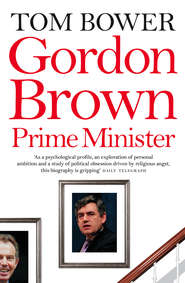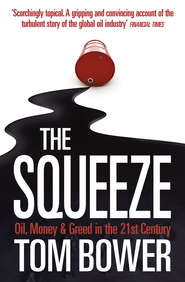По всем вопросам обращайтесь на: info@litportal.ru
(©) 2003-2024.
✖
Conrad and Lady Black: Dancing on the Edge
Настройки чтения
Размер шрифта
Высота строк
Поля
(#litres_trial_promo) That was not a barrier to a relationship, and nor was Sylvie, Jonas’s wife. Jonas and Amiel began an affair, although Amiel did not regard it as an exclusive attachment. She was now better fed and dressed, making her breasts appear larger. ‘The bigger and more pronounced they are,’ she would later write, ‘the more attractive they are.’ Depending on her mood, she could appear flat-chested, while on other occasions the size of her breasts fuelled speculation about implants. ‘I’ve got one thing you haven’t got,’ she boasted to male journalists vying for the same interview: ‘cleavage.’
(#litres_trial_promo) Shamelessly, she would ask a colleague for advice about something she had written, and while he read her pages, rest a breast on his shoulder. As she self-consciously walked through CBC’s corridors like a queen with an entourage, her remarkable physique excited drooling and gossip. At parties, men were mesmerised by her sexuality. ‘Holding her thin waist was so erotic, so powerful,’ sighed one admirer. Some of her relationships ended with her ‘seeing stars’ after being hit by a boyfriend;
(#litres_trial_promo) one ended in an abortion;
(#litres_trial_promo) but almost invariably her men, including cameraman Ed Long, discovered that after one night, they were forgotten the following morning. Long’s attempt to seek an explanation was spurned by Amiel, who turned her back as he approached. ‘I could cope with three men a week at CBC,’ she would later jokingly tell a boyfriend. ‘Each man was satisfied with two nights, and that left me one night to wash my hair.’
‘She’s gorgeous,’ announced Ross McLean, regarded as CBC’s most brilliant producer. Moses Znaimer, another producer, agreed that Amiel, who was then employed as a secretary by Perry Roseman on The Way It Is, a current affairs programme, should be turned into a star. Glamour photographs were distributed to promote the new celebrity interviewer. Her debut was not a success. The autopsies of Amiel’s on-screen abilities were merciless. ‘She comes across as affected but not stylish,’ said one producer. ‘She’s too guarded, not sharing her personality with the audience. She’s not a natural.’ Another senior producer agreed: ‘Her fine-boned chiselled features make her attractive but you can’t take her seriously.’ ‘Too nervous and lacks gravitas,’ concluded a third, who carped that her prominence had been won by manipulating Ross McLean. Unexpectedly, Amiel’s overt sexuality had undermined her professional ambitions. Producers were reluctant to use a woman whose appearance and manner were distracting. The struggle for success increased her insecurity, although initially she ignored her failure. ‘All in all, I learned to be a reasonably smart-ass interviewer,’ she would recall in self-praise.
(#litres_trial_promo) Appearing in a 1966 TV satire as a bikini-clad temptress of Eddie Shack, a wild ice-hockey player, did not enhance her image as a serious journalist.
(#litres_trial_promo) Her on-screen career was in jeopardy. In her search for blame she would admit that she had been ‘too self-conscious’, and she later conceded that her appearance as ‘a lacquered apparition with bouffant hair, glazed smile and detachment bordering on the unconscious, often reinforced by the mandatory dosage of Elavil’, was not a winner.
(#litres_trial_promo) But the real cause of her misfortune, she decided, was a CBC ‘syndrome’ that excluded ‘non-leftists’ from appearing on the channel. Although it was not a full left-wing ‘conspiracy’, she said there was a prejudice against her anti-Communism. She also perceived another bias. ‘I’m unhappy with my nose,’ she told Claire Weisman, an artist who was temporarily answering telephones in the building, ‘and I’m having it fixed.’ Weisman was surprised. ‘Why?’ she asked. ‘Haven’t you noticed it?’ said Amiel. ‘Noticed what?’ ‘You’re Jewish, aren’t you?’ ‘Yes.’ ‘Haven’t you noticed the anti-Semitism here?’ ‘No,’ replied Weisman. ‘Absolutely not.’
Amiel had long been unhappy about the shape of her nose. Variously described as ‘Roman’ or ‘soft Jewish’, it curved gently down, whereas she wanted the ‘turned-up’ nose prevalent among the gentile, white Anglo-Saxon community. She confided her dissatisfaction to George Bloomfield, a gregarious CBC producer whom she had ‘spotted’ a year earlier. Soon after introducing herself, she rented a flat in Bloomfield’s block in Toronto’s High Park, and a few weeks later she moved into his apartment. ‘I don’t like my nose,’ she had repeated for a year. ‘It’s a perfect nose,’ replied Bloomfield mechanically, but eventually he agreed to pay for the surgery. The doctor produced a nose described by Bloomfield as ‘pug’ and by Larry Zolf, now also employed at CBC, as a ‘button nose’ and ‘an insult to the Jewish people. Amiel was ashamed of the perfectly good Jewish nose she had. Now she looks like a crazed Shirley Temple.’
(#litres_trial_promo) Amiel’s depression intensified. ‘It’ll improve,’ the surgeon assured her. Frequently plunging into her handbag to take pills, Amiel set off to California as senior CBC producer Eric Koch’s script assistant to film a documentary, Culture Explosion. ‘She’s a bright, moody Jewish girl cursed by her mental fragility,’ concluded Koch, who became disenchanted with Amiel at a family dinner hosted by his brother. ‘I’m not feeling well,’ she announced, clearly bored. ‘Take me home.’ ‘Out of the question,’ Koch replied, outraged by her selfish behaviour towards his family. ‘Sit down.’ Refusing to obey, Amiel asked a member of the film crew to drive her to her hotel. Clearly she was prepared to live only on her terms. She had, Koch heard, walked out of concerts if a more exciting alternative sprang to mind.
Back in Toronto in 1968, George Bloomfield was preparing to move to New York and make feature films. One night he and Amiel were disturbed by the doorbell. Bloomfield stumbled out of bed. ‘Who is it?’ he asked. ‘Telegram,’ said the voice. Bloomfield opened the door, and was pushed aside by Gary Smith. Finding his way into the bedroom, Smith saw Amiel. He then left. Soon after, Amiel’s mother and stepfather visited the flat for an unemotional but civilised reconciliation. The ghosts of her ‘wild years’ were being interred. To break from her past, she decided to abandon CBC and move with Bloomfield to New York. ‘I’m a camp follower,’ she admitted.
(#litres_trial_promo) Soon after their arrival she found a nose surgeon used by Hollywood’s stars. Bloomfield agreed to pay for the second operation. This time she declared the result ‘great’.
Life in New York suited Amiel. Bloomfield was fun, and paid for all her needs. ‘Ten seconds after waking up,’ he recalled, ‘we’d both be laughing.’ She began to read voraciously, stretching her intellect. Unlike in Toronto, she was surrounded by the ‘chic world’ of film celebrities, and came eagerly close to anti-Vietnam war and pro-feminist agitators, notably Jane Fonda and Alan Alda, who were working with Bloomfield. Hovering around Fifth Avenue, she watched the rich buy furs and jewellery, envious of how they recognised each other and could ‘trade fashion names and tips’.
(#litres_trial_promo) At length, she justified to Bloomfield her considerable expenditure of his money on exclusive brands: ‘You’ve got to have the right belt, purse, shoes and scarf. The dress doesn’t matter.’ Her easy-going manner, friendliness towards everyone, and willingness to engage in any fantasy Bloomfield suggested in their bedroom, suggested a happy woman. Unseen by others, however, there was another side.
The prescription of the antidepressant Elavil, described by Amiel as ‘my undoing’, had neutralised her sense of responsibility. ‘Nothing was my fault,’ she recalled, because ‘everything is socially or chemically determined’.
(#litres_trial_promo) Drugs, Bloomfield complained, had become a routine part of his girlfriend’s life. Screaming in her face, he discovered, grabbed her attention. ‘When you take drugs you look just like your mother,’ he shouted at her. Amiel stood silently, pushing both wrists upwards. Like make-up, the image of the independent and tough woman evaporated, replaced by a vulnerable individual requiring direction to cope with her confused emotions.
Bloomfield would be editing his latest film with Alan Alda in London, where the producers were providing a luxury flat near Buckingham Palace for three months. Amiel was excited. Since her own career as a freelance writer had ground to a near halt, the change would be stimulating. Her relationship with Bloomfield was friendly but no longer passionate. She could use the trip to develop her skills as a hostess. In anticipation of dinner parties, she invested heavily in weighing scales, cooking dishes, recipe books and measuring spoons. To the surprise of Lazlo Kovacs, a guest at one of her London dinner parties, she wore a stopwatch around her neck. Anxiously she watched the seconds tick away. ‘Quick, finish your plate,’ she urged, ‘the next course is coming.’ Everyone, including Bloomfield, would recall the fuss rather than the meal.
Life in London offered a good chance for Amiel to renew her relations with the Buckmans, especially Irene, her father’s older sister, and Peter, her cousin. ‘Do you think it’s too scandalous?’ she asked, modelling a revealing bikini in front of Peter Buckman. Did her choice, she was anxious to know, defy the propriety expected of a Jewish princess? Buckman assured her that she looked beautiful. Meeting the Buckmans was fun, especially Uncle Bernard, the businessman and property developer. ‘You’re very proud of him, aren’t you?’ said Bloomfield. Amiel nodded. Her uncle’s large house in Hampstead, the country home he had bought his son, his own houses on the Côte d’Azur and in St Moritz, his big car and a suspected Swiss bank account excited a woman who wanted wealth but also remained committed to some socialist ideals. In one respect, Bernard Buckman was a mini-idol for both George and Barbara. During his many business trips to China he had met Mao Tse-tung and Chou En-lai, the Communist leaders, whom they both venerated. Plaintively, Amiel urged Bernard Buckman to negotiate Mao’s approval of a film which would feature Edgar Snow, the author of Red Star Over China, a eulogy of Mao’s revolutionary war. Bloomfield would be the producer. Buckman agreed, but Snow’s death terminated the plan. Amiel’s disappointment revealed no suggestion of disapproval of her uncle’s profitable combination of business and politics.
Amiel’s return to Toronto in 1972 was auspicious. She started writing for local magazines, a divorce was arranged with Gary Smith, who cited her adultery with Bloomfield, and she began searching for a new life after what Bloomfield would later call ‘five aimless years’. By then her sexual relations with Bloomfield were rare. He was focused on his work, and was unconcerned whether she was sleeping with other men. He had steadfastly ignored her desire for children. In need of a man, Amiel approached George Jonas to resume their relationship. Her politics were shifting sharply to the right, she needed intellectual stimulation and a totally different life. By living with Jonas, she could concentrate far more on her own work.
George Jonas had been living for several years with Beverley Slopen, a literary agent. Amiel’s appearance in their apartment did not immediately alarm Slopen. She knew Amiel as ‘a hypochondriac who George might take for a weekend to the Bahamas but could not afford to take shopping’. She did not anticipate that Amiel would provoke a very public split between her and Jonas, after which Amiel returned to her apartment in Chestnut Park Road. ‘I’ve decided to leave,’ she told Bloomfield calmly. Bloomfield was not surprised. ‘Found someone else?’ he asked. ‘I’m going back to George,’ said Amiel. That news did shock Bloomfield. How, he wondered, after five years living with supporters of the feminist and anti-war movements, could she live with such a right-wing man? He never received an answer. Soon after, Bloomfield was called by Jonas and invited to meet at the Coffee Mill, his favourite Hungarian restaurant. According to Bloomfield, while they spoke Jonas took out a gun and showed it under the table. ‘I can’t live without her,’ said Jonas. ‘Don’t try to take her away.’ Jonas describes Bloomfield’s scenario as ‘ludicrous, the invention of a film producer’. Whatever the truth of the matter, the emotions of twenty-five years previously are evidently undiminished.
In her new life Amiel worked frantically, laboriously writing acclaimed magazine articles on various social issues throughout the night, carefully choosing each word in her efforts to express original opinions in a cautious climate. Simultaneously, she reemerged as a popular television pundit to disparage Marxism, feminism and Canada’s dependency culture. Trading on the image of a sexy intellectual, she showed off bruises at a dinner party and declaimed, ‘Sex is no good without pain.’ Together with Jonas she posed as a star with brains and beauty, charm and attitude. Those unconvinced by her self-education during her years with Bloomfield credited Jonas as her Svengali, dubbing her ‘the finest second-hand mind in Canada’. This further eroded her self-confidence, already undermined by the painful withdrawal symptoms after she had given up Elavil. She became fearful of cancer and other illnesses. Her critics spoke of borderline narcissism – which she interpreted as evidence of her growing importance.
Living with Jonas, a poet, journalist and political philosopher, was ideal for an aspiring writer. In October 1974, having discovered that Jonas was also Jewish, she announced, ‘I’ve made an appointment with the local rabbi.’ They were to marry later that month, in a synagogue, with only six guests. Over the following months Amiel’s self-confidence soared. Although she voiced a fear of being disliked, and hesitantly dismissed her urge for children as premature, she asserted absolute certainty about her political convictions. Having shed her last vestige of sympathy for compassionate government, she placed herself in the vanguard of the cause of restoring red-blooded capitalism to socialistic Canada.
Peter Newman, the mercurial editor of Maclean’s, Canada’s only popular political magazine, was impressed by Amiel’s right-wing, anti-authoritarian, iconoclastic criticism of modern fads. In 1966 she had written an astutely argued article, ‘Let’s Reinstate Debtors’ Prisons’, for the magazine, advocating that debtors who failed to pay their bills should be imprisoned.
(#litres_trial_promo) Ten years later Marci McDonald, a star columnist, resigned, and there was a vacancy. ‘Marci was a bitch,’ said Newman admiringly, ‘but we’ve got a bigger bitch to take her place.’ Amiel’s extreme conservatism, he calculated, would attract profitable controversy.
National prominence enhanced Amiel’s visible self-confidence. ‘She was the sort of woman,’ Newman noted, ‘who kept spilling out of her dresses, then blamed the dresses.’
(#litres_trial_promo) Her response to those who whispered about implants was savvy. ‘If I used silicone,’ she told Newman, ‘my breasts would be twice as big. I don’t do things by halves.’
(#litres_trial_promo) Fame and independence sparked her weariness with Jonas. Marrying a Jew, she discovered, was not such a good idea after all. His emotional needs were too similar to her own, and rather than partying, he preferred staying at home. Jonas was not the first man to discover the truth of her confession, ‘I’m polyandrous.’ One man could not satisfy her. She was constantly propositioned by men and women, married and single. The ferociously heterosexual Amiel wanted to experiment with most kinds of relationships and sexual antics.
Hanging around the Maclean’s office late one evening towards the end of 1976, Amiel noticed Peter Brimelow, the magazine’s handsome twenty-nine-year-old business editor, born in Lancashire, England. Drawing on her consummate experience, she made signals to encourage his approach. The long dark hair and green eyes of the seductress who had just been named ‘Canada’s most beautiful woman’ by a magazine was irresistible to the younger journalist, unaware of the licentious world he was entering.
‘I’ve got to go for an appointment,’ Amiel often told Jonas, with whom she was writing By Persons Unknown, a prospective non-fiction bestseller about a Canadian businessman who hired killers to murder his wife, a fashion model. In great secrecy she visited Brimelow’s flat. If she went away overnight, Jonas believed she was travelling on an assignment. Her infidelity evoked no crisis of conscience. As with her other relationships, Amiel’s self-indulgence was to please her latest admirer. ‘You’re a luxury,’ she told Brimelow in bed. ‘You’re of no use to me other than for sex and passion.’ Bites and scratches were his badges of her eroticism. ‘What makes people good lovers,’ she later reflected, ‘is not their sexual technique but their sexual being. Extremes of ineptitude aside, it is not how a man touches you, but who the man is that determines your sexual response.’
(#litres_trial_promo) The rawness was her attraction: ‘No matter how many times the act is performed, one is still in awe of its potential … whether it is done for love or for money, for spite of for kicks, the sexual act remains the key to our entire being.’
(#litres_trial_promo) Whether fooling around with Brimelow, joking about another affair with a Hungarian bankrobber who ‘stored gelignite under my bed’, or mimicking mutual friends, Amiel blessed her eternal youth. ‘I’ll never get old,’ she said. ‘That’s a battle I’ll never lose.’ The chilling implication was her preference for death rather than looking at a wrinkled face in the mirror. Inevitably, the relationship bore a cost. Brimelow was not the first to discover that losing one’s heart to Amiel meant a loss of self-control, and she enjoyed witnessing helplessness in her men. Lying in bed with Brimelow early on New Year’s Eve in 1976, she knew that later, while she was celebrating with her husband, Brimelow would be partying with a girlfriend. Seized by a mixture of insecurity and fury at her inability to control Brimelow, she dug the nails of both hands deeply into his chest, drawing blood. Brimelow’s girlfriend, Amiel smiled, would get the message.
Hard work, stylish writing, deep thought, exceptional looks and unconventional opinions had transformed Barbara Amiel into the nation’s conservative star. Describing herself with relish as a ‘very merchandisable’ right-wing pundit or ‘the redneck in a Givenchy dress’, she invited notoriety and a reputation for bitchiness as the Jew who criticised Israel, the advocate of personal responsibility and the critic of equal-opportunity politics.
(#litres_trial_promo) Without loyalty or deference to the Canadian establishment, the outsider reproached the natives. While pouting about her need for privacy, revelations about her sentiments in Maclean’s became the cornerstone of her journalistic shock. Like many celebrity pundits, she occasionally confused intelligence with wisdom. Her prominence transformed a spat with the Ontario Human Rights Commission after she described Germans during the First and Second World War as ‘Huns’ into a national debate. ‘You’d have saved us a lot of trouble,’ said Newman, ‘if you’d called them “Sauer Krauts”.’ To Newman’s surprise, Amiel burst into tears. ‘She’s a woman without a sense of humour about herself,’ the editor concluded,
(#litres_trial_promo) puzzled by her insistence that ‘harsh words can’t harm me’.
(#litres_trial_promo) Her sensitivity did not always extend to thoughtfulness about others. Careless about the magazine’s schedules, she delivered articles with trembling hands at the editorial office after the deadline, clutching her head to relieve the pain of giving birth to a masterpiece, and awaited the applause. ‘A drama queen,’ concluded Peter Newman, ‘and a whining pest over each lost comma and adjective.’ For sympathy, she constantly telephoned Peter Brimelow. Even in the middle of the night she required an audience to hear about her work, her upsets and the praise she had attracted.
The relationship between Amiel and Brimelow was intense, yet to Brimelow’s despair she would not abandon Jonas. In revenge, Brimelow began an affair with Amiel’s assistant Dia, an attractive Anglo-Indian. ‘You’re having her, aren’t you?’ screamed Amiel. ‘How could you?’ Brimelow was unapologetic. Amiel refused to leave Jonas, he retorted, so why could he not also have an affair? Walking a tightrope, Amiel justified her own infidelity while condemning her lover’s.
In early 1979, Brimelow accepted a job in Washington, where his latest girlfriend, called Maggie, lived. In recent weeks he had described Maggie to Amiel as a potential wife. Amiel was given a choice. If their relationship was to survive, she would have to leave Toronto and her husband. Still undecided, she arrived at Brimelow’s flat with her sister Ruth. After Ruth’s departure, Amiel remained to say farewell. In bed, she announced a game of noughts and crosses on Brimelow’s chest. Her scratch marks were deep, the blood oozed. She knew that Maggie would understand.
A transitional moment in Amiel’s life had arrived. She was still married to Jonas, but she visited Brimelow three times in Washington, and at the same time started an affair with Sam Blyth, thirteen years younger than herself, and with similar looks to Brimelow’s. After two months, her decision was final. ‘It’s time to see Sam,’ she told a friend. She abandoned her husband and long-time lover, and moved into Blyth’s dilapidated Toronto home. The dalliance, she reckoned, would extricate herself from her marriage. Handsome, charming and poor, Sam Blyth offered new excitement. ‘A big adventure,’ said Amiel. ‘A lot of fun, like a journey in a big cookie jar.’
(#litres_trial_promo) Brimelow took the news calmly, while Jonas was distressed about no longer meeting Amiel’s requirements. ‘She was not a housewife,’ he said, ‘and I am not a house-husband. We agreed what we should do is find a wife, for both of us.’
(#litres_trial_promo) Jonas soon recovered. ‘How would you like to go to Paris for breakfast?’ he asked a Korean woman managing a restaurant. They eventually married.
Amid that hiatus Amiel began writing Confessions, her autobiography, a mixture of political polemic and attention-seeking striptease. ‘I am a wandering Jew,’ she wrote. ‘I always have my toothbrush handy. My allegiance is not to any piece of earth or particular set of rock outcroppings. My allegiance is to ideas, and most especially to the extraordinary idea of individual liberty … My suitcase is packed. I do not feel bound to any country or any popular will more than to my own conscience.’
(#litres_trial_promo) In an article published simultaneously in the magazine Chatelaine called ‘Nothing Succeeds Like Excess’, she confessed to being a shameless, self-promoting exhibitionist who enjoyed intellectual domination. Her critics unfairly classified such confessions as proof of the ‘borderline personality disorder’ suffered by attention-seeking addicts, or narcissism. Amiel’s sophisticated political arguments, however, protected the book from ridicule when it was published in 1980.
Rescuing Canada from socialism and ‘the spiritual and moral bankruptcy into which it has fallen’ was the heart of Amiel’s cause.
(#litres_trial_promo) Like Conrad Black, she condemned the Globe and Mail and the Liberal government of Pierre Trudeau for distorting the policies of anti-Marxists and conservatives. The Liberal ‘thought police’, she wrote, were conducting a ‘witch-hunt’ against those championing the individual against the state. She railed against the bureaucrats promoting political correctness, multi-culturalism and the conditions of working women, and their fellow travellers who were championing sexual harassment prosecutions, denigrating prostitutes, inventing child abuse as a political weapon, lamenting men’s abuse of the clitoris and generally suppressing opportunities. Her black cleaner in New York, she complained, had refused to move out of a poor neighbourhood and seek a better education for her children because she expected improvements to be brought to her at public expense.
(#litres_trial_promo) The Canadian media and political establishment, she protested, were deliberately concealing the horrors in China and the Soviet Union. Forgetting her former support for the anti-Vietnam war movement, she confessed to having ‘little sympathy or respect for draft-dodgers’, and ‘loathed the sight of pretend-moralists’.
(#litres_trial_promo) She was, she wrote, thrilled that Jane Fonda had been arrested by US Customs for carrying drugs which turned out to be Codeine given to her by Amiel for a headache. ‘I was filled with a warm glow,’ she wrote. ‘It was my contribution to the war effort.’
(#litres_trial_promo)
Confessions also included a florid description of Amiel’s English roots. After interviewing most of her family during her stay in London in 1971, she described herself as born into a family of British Marxists. The exaggeration justified what she admitted were ‘snide remarks’ about Bernard Buckman. In ungrateful language, she condemned her uncle as an unprincipled, rich hypocrite, living in his big, sunlit Hampstead home where ‘the clichés bounced off the cut crystal’ while indulging in ‘wilful blindness’ about China and the Soviet Union’s repression and bloodshed.
(#litres_trial_promo) One assertion which hurt the Buckmans was that the family was ‘financed by mainland China’.
(#litres_trial_promo) ‘She’s abused our hospitality and twisted the family history,’ Bernard Buckman told his wife Irene. ‘Forgive her,’ urged Irene, uneasy about her niece’s mistreatment by the Amiels. But even Irene was puzzled by Barbara’s inaccurate reconstruction of her background in her attempt to prove her new values. In a book extolling the importance of a journalist’s honesty, complained Irene, Barbara’s inventions were surprising.











